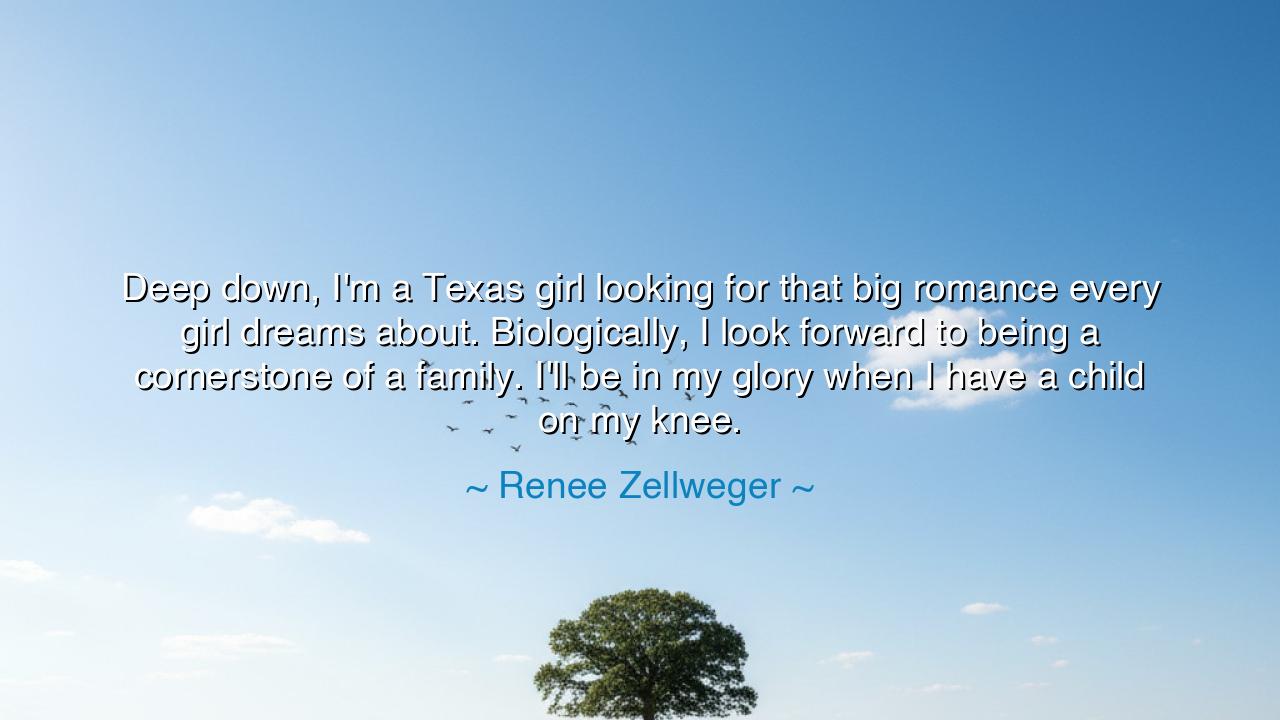
Deep down, I'm a Texas girl looking for that big romance every
Deep down, I'm a Texas girl looking for that big romance every girl dreams about. Biologically, I look forward to being a cornerstone of a family. I'll be in my glory when I have a child on my knee.






The words of Renee Zellweger, “Deep down, I'm a Texas girl looking for that big romance every girl dreams about. Biologically, I look forward to being a cornerstone of a family. I'll be in my glory when I have a child on my knee,” are spoken with the tenderness of one who knows both the glamour of the world and the simplicity of the heart. Beneath the surface of fame, fortune, and fleeting lights, she reaches toward something ancient and sacred—the yearning for love, family, and belonging. In her confession lies a universal truth: that no matter how high we rise in the eyes of the world, the soul still hungers for roots, for intimacy, for the quiet continuity of life that only love can give.
To call herself a Texas girl is to claim more than a birthplace—it is to acknowledge a spirit shaped by openness, warmth, and resilience. The land of wide skies and endless horizons becomes a metaphor for her inner world, a heart that longs for both freedom and connection. Amid the vastness of success, Zellweger speaks of grounding—of finding meaning not in applause, but in the simple joy of nurturing others. In a time when many chase achievement and call it fulfillment, her words remind us that true glory may not be found in the pursuit of more, but in the embrace of what is timeless: family, love, and legacy.
The origin of this quote lies in Zellweger’s reflections on life beyond Hollywood, on the tension between ambition and authenticity. Having achieved the heights of fame through her craft, she understood that even the most dazzling achievements fade when measured against the enduring light of human connection. Like the heroines she has often portrayed—women of strength, tenderness, and complexity—she recognizes that the heart’s greatest triumph is not in performance, but in presence. The “big romance” she dreams of is not merely passion, but partnership—the meeting of souls that builds rather than consumes.
This longing is not new to her time, nor unique to her gender. Across the centuries, poets and philosophers have spoken of the divine union that brings both creation and meaning to life. In the story of Penelope and Odysseus, we find a love that endures not through perfection, but through patience. For twenty years she weaves and waits, trusting that the bond between them will outlast both distance and desire. Such love, grounded in faith and endurance, becomes the cornerstone of civilization itself. Zellweger’s words echo this same understanding: that love is not a fleeting joy, but the foundation upon which family and future are built.
The image of “a child on my knee” carries a power that transcends time and culture. It is the image of the eternal cycle—the parent passing wisdom to the child, the continuation of life through tenderness. In that moment, the individual dissolves into something larger—the continuum of generations, the river of humanity flowing ever onward. To hold a child is to glimpse eternity in mortal form. When Zellweger says she will be “in her glory” in such a moment, she is describing the profound fulfillment that arises when one becomes both giver and guardian of life. It is not the fame of the stage, but the quiet majesty of love that endures beyond it.
And yet, her words also carry a gentle courage. In an age that often prizes independence above intimacy, she dares to speak openly of romance and motherhood as sources of power, not limitation. The ancients understood this too. The Roman matron, though confined to the domestic sphere, was revered as the pillar of the household—the weaver of civilization’s fabric. From her hands came not only life, but virtue, honor, and strength. To desire such a role is not weakness, but wisdom—to see that the truest acts of creation are those that nurture hearts and shape generations.
The lesson, then, is one of balance and truth. Pursue greatness, yes—but remember that the measure of a life is not only what one achieves, but what one loves. The world will always tempt us toward spectacle, toward endless striving, but the soul finds peace only when it returns to its natural rhythm—to giving, to connecting, to belonging. If you dream of romance, do not be ashamed; if you long for family, do not call it small. These are the quiet miracles that sustain the world.
So let us take from Zellweger’s confession a call to authenticity. Let us remember that our greatest victories will not be written in headlines, but in the hearts we touch and the lives we nurture. The Texas girl in her speaks for all of us—for the part of the human spirit that, despite the noise of the world, still dreams of love, still believes in home, and still yearns to cradle the future in its arms. For in that act, as she so beautifully said, we find not only joy, but glory.






AAdministratorAdministrator
Welcome, honored guests. Please leave a comment, we will respond soon